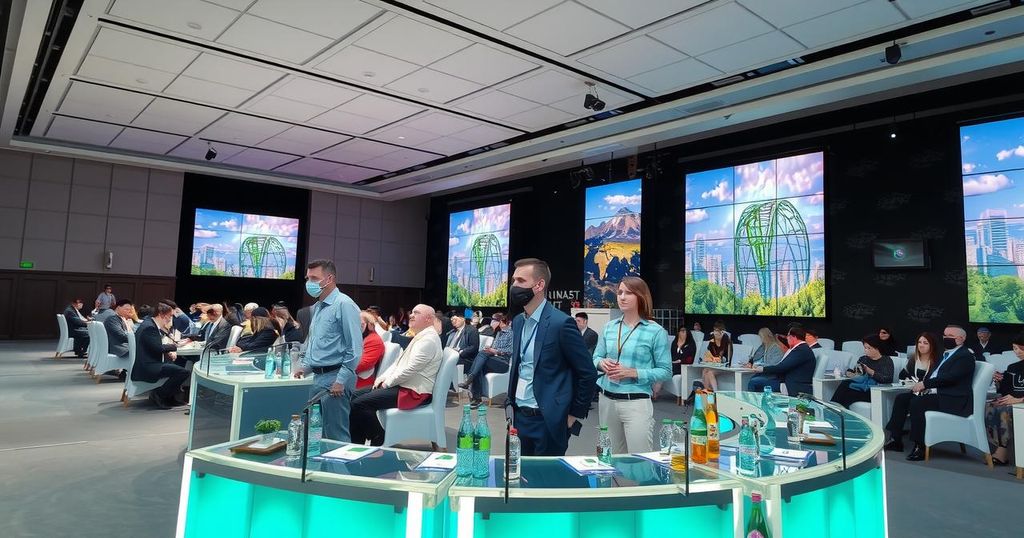The COP29 summit in Baku, Azerbaijan, from November 11-22, 2024, brought together global leaders to discuss the urgent issue of climate change. The conference highlighted mixed outcomes, with significant discussions around climate finance and the roles of various sectors in emissions reduction. Although the involvement of youth leaders was a point of optimism, the commitment of $300 billion towards climate efforts was deemed insufficient to meet the demands of affected nations, casting doubts on the sincerity of proposed actions.
The 29th United Nations Framework Convention on Climate Change, known as COP29, was held in Baku, Azerbaijan, from November 11 to 22, 2024. This summit gathered leaders, activists, and innovators from around the world, aiming to confront the pressing issue of climate change. Although there were discussions on innovative technologies and collaborative efforts, the outcomes displayed a mix of hope and frustration. Important discussions centered on financial commitments, particularly concerning funds directed towards developing nations. Representatives from countries like India and Nigeria expressed dissatisfaction with the targeted increase in climate finance, arguing it did not meet the urgent needs of nations most affected by climate impacts.
Numerous sessions highlighted the need for immediate action, presenting alarming climate data that underscored a growing sense of urgency. However, there remains skepticism about the willingness of major polluters to enact real change. The role of the construction industry was a key focus, as it significantly contributes to greenhouse gas emissions yet also offers opportunities for sustainable innovation.
Youth empowerment was a major theme of COP29, with discussions emphasizing the importance of equipping young leaders with the knowledge and skills necessary for promoting sustainability within their communities. This highlights a reliance on younger generations to tackle climate change, raising concerns about the fairness of this expectation as it is a problem they inherited. Moreover, the balance between energy efficiency and renewable sources was explored, calling for an integrated climate strategy that encompasses both elements.
A poignant moment occurred during discussions on climate justice, where representatives from small island nations conveyed their existential fears related to rising sea levels, poignantly reminding attendees of the realities faced by those most affected by climate change. Despite a commitment to increase funding for climate action, concerns about the adequacy of only $300 billion compared to the trillions needed were voiced.
COP29 encapsulated a rise in cautious optimism coupled with a recognition of the dire need for actionable leadership and accountability in climate commitments.
The Conference of the Parties (COP) serves as a crucial international platform aiming to address the climate crisis through collaborative efforts among countries worldwide. Specifically, COP29 is a continuation of this effort, highlighting the ongoing challenges and dialogues surrounding climate finance, technological innovation, and the empowerment of young leaders. Understanding the roles of various stakeholders and their perspectives is vital, as differing national interests and levels of commitment can impact collective progress towards climate targets. As discussions intensify surrounding emissions reduction and climate finance, the summit serves as a barometer for global priorities regarding climate action and environmental sustainability. The framing of these discussions, particularly the necessity for equitable financial solutions for developing nations, underscores the complexity and urgency of the current climate crisis. Youth leaders and emerging activists play a prominent role in this dialogue, promoting the need for immediate and substantial action to mitigate the effects of climate change, as well as the necessity for robust frameworks capable of measuring success and holding nations accountable for their commitments.
In conclusion, COP29 in Baku acted as both a venue for pressing discussions on climate change and a reflection of mixed sentiments regarding progress and accountability. While there was hope surrounding the emergence of youth leaders and innovative solutions, significant challenges remain. Financial commitments have been criticized as inadequate in meeting urgent needs, particularly for developing nations. The inequality in contributions to climate change and the expectations placed upon younger generations were also emphasized, highlighting the necessity for actionable leadership from those in power. Ultimately, COP29 laid bare the pressing need for governments and industries to respond decisively to the climate crisis.
Original Source: www.stirworld.com






